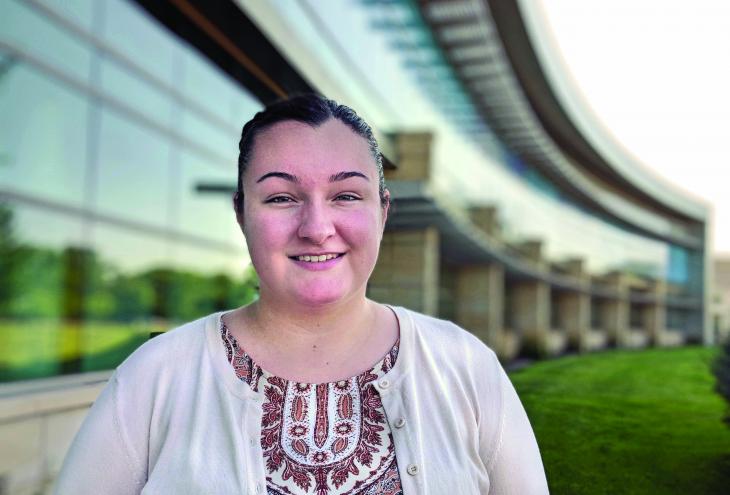Learning how to smoothly transition from learning in a classroom to navigating a workplace can be tricky. At her internship with Boston Scientific, University of Oklahoma student Alexis Keeling learned how to be a working engineer. Besides picking up a lot of company-specific procedures and tools, she was able to see how what she has learned in school applies to real-life manufacturing. Keeling, Cherokee, says that as an intern you are expected to do true project work that applies to your education, as well as learn how a company functions, outside a textbook.
Clearly, Keeling doesn’t shy away from challenges. When she was pursuing internships, the Pryor Creek, Okla., native made it a priority to find opportunities that would include relocating to see what life can be like in other places. “I’ve had the chance to live in Massachusetts and Minnesota, and to accomplish things that I never would have done without pushing myself,” she says.
Keeling’s drive is not surprising when you look at her family. Her great-grandmother was a single mother in the 1950s who went back to school and earned a degree in electrical engineering to support her family. She became the first woman who was not a receptionist hired at her company. “I’m so thankful people like my GiGi were able to pave a way for women to be able to find their passion and not be passed over for who they are,” says Keeling. “My mother’s side gave me the passion and fire of being a woman in STEM. My father’s side have all been involved in manufacturing, and I’ve always loved seeing how products are made.”
Now a senior at OU, Keeling was inspired to major in engineering back in the summer after her first year of high school when she attended DEVAS (Discovering Engineering Via Adventure in Science), a camp for young women who excel in math and science. She says she was getting discouraged with engineering until the industrial and systems lecture, where one of Keeling’s future professors broke the participants into groups. “She handed us supplies and told us to build the most efficient sundae bar. We all ate ice cream while she related this engineering major to the medical field, to manufacturing, to government, and to many other areas,” says Keeling, recalling that the professor demonstrated how all areas of life need to be efficient to work and be sustainable. “This major clicked for me and I was able to understand the need for engineering.”
Finding a focus for her studies early hasn’t meant that college has been all smooth sailing. In fact, the largest obstacle Keeling has experienced as a Native woman in STEM is the disbelief she encounters from people who should be encouraging. “Before classes started my freshman year, I went to campus to introduce myself to key people I would be in contact with. One of the individuals, a Native American mentor who is no longer employed by the university, told me that I would fail out before my sophomore year,” she recalls. “This was jarring for a teenager who had not yet started college. I was told that Native American students cannot succeed in STEM-related fields at OU.”
But that “mentor” didn’t count on Keeling’s persistence. “Even if you aren’t perfect at a subject or struggle finding your place, not giving up is the most important thing,” she says. “From my experience, no one expects you to be perfect on the first try and there is honor in knowing where you’re lacking. Take the time to better yourself — to not give up.”
STEM fields may not be easy, Keeling acknowledges, but they’re not necessarily hard. “You’re being taught a new language, a new way of thinking about problems,” she points out. “Knowing that you will not understand everything about every subject the first time will help so much.”
She also has good advice for students thinking about applying for an internship. “Find resources at your college or high school that can help with resume review and interview practice. People who work in career development roles are genuinely trying to help you succeed and highlight your best values to future employers,” she says. “Also, try reaching out to recent graduates who are on a career/educational path that you would like to work toward. Most people are willing to help.”
Keeling’s experience has made her an enthusiastic supporter of internships, especially at Boston Scientific. “Besides doing true project work that’s relevant to your education, the company provides fantastic mentorship programs, as well as resources for career development,” she says. “It takes a while to learn lingo, procedures, and people, but once you find that groove of how the company works, they allow you to make real change and get amazing project work under your belt.”
For now, Keeling is unsure about what role she ultimately wants to achieve in her career, but some of her plans are firm. She has accepted a full-time position with Boston Scientific that will start after her OU graduation. “I do know that I hope to be able to start a scholarship for Native American students pursuing STEM,” she adds. “Because of organizations like AISES, representation and resources have improved tremendously. But there are plenty of students who are still not exposed to these opportunities and jobs. I would like to be part of the change in helping inspire young people and showing them that STEM majors can help make a difference in the world.”













